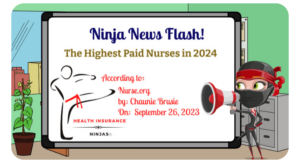
Contract Negotiation Made Easy: Fire Tips for Travel Nurses
- August 4, 2022
- Ninja News Flash
Contract Negotiation? Are you a Travel Nurse looking to take control of your career? If so, one important aspect to consider is mastering Contract Negotiations. Negotiating your contract can play a significant role in shaping your experience as a Travel Nurse and ensuring you receive fair compensation and benefits.
To help you navigate this process with confidence and success, we have compiled seven valuable tips for mastering Travel Nurse Contract Negotiations.
According to:

- Promptness Matters
- Keep Electronic Papertrails
- Research Pay Rates
- What is...True Rate of Pay
- Understand Benefits Packages
- Calculate Travel Costs
- Plan WAY Ahead
With Contract Negotiations, Don't be Tardy to the Party
In the fast-paced industry of nursing, it’s important to respond promptly and reinforce your interest when you receive an offer. Right after receiving the offer, send a quick response expressing your gratitude and excitement about the opportunity. Don’t hesitate to ask how long you have to consider the offer.
During this time, take a moment to carefully read through the details and ensure that you fully understand what you’re getting into. It’s also wise to research what would be a fair negotiation amount. Once you’ve gathered all the necessary information, make sure to contact the employer within their specified timeframe or within 48 hours if no specific time was given.
If you decide to negotiate, we suggest requesting a phone conversation rather than negotiating over email. By speaking directly with the potential employer, you can demonstrate your commitment to the position and show that you are genuinely interested in finding mutually beneficial terms. If negotiating via email is more appropriate for your situation, make sure your response remains friendly and polite. Clearly communicate your thoughts and provide comprehensive information.
Remember, being proactive and positive in your approach will greatly increase your chances of success!
Utilize Your Email to Create Papertrails During Contract Negotiations
By utilizing email as your primary communication tool, you can streamline your Contract Negotiations and foster clear and efficient communication. Maintaining a digital trail ensures that everyone involved is on the same page. Even if certain discussions occur over voice, it’s important to send a follow-up email summarizing the agreed-upon decisions to ensure alignment among all parties.
And when the final offer is determined, don’t forget to request it in writing. Having a written record allows you to refer back to it whenever needed, providing peace of mind and protection in case anything deviates from your expectations.
In Contract Negotiations You Must Research Pay Rates First
Get excited about discovering the average pay rates for your specific area of expertise! Nursing salaries can vary greatly depending on factors such as specialty, geographic location, and level of experience. To gain a better understanding of how your salary stacks up against others in the field, check out reputable sources like US News and All Nursing Schools.
Understand All Aspects of Pay for Contract Negotiations
Before you begin your Contract Negotiations, it’s important to have a clear understanding of your true rate of pay. Many hourly rates include non-taxable items that cover expenses like lodging, meals, and incidentals. By knowing the breakdown of these components, you can calculate how much money you’re actually earning each week. This knowledge will be valuable for budget planning and future financial considerations.
When reviewing Travel Nurse job postings, it’s helpful to understand what is meant by total pay. The compensation mentioned in the description may be listed as an hourly rate, such as $62/hour. The total pay is then calculated based on the guaranteed number of hours per week. For example, if a job guarantees 36 hours per week, you can expect a total pay of $2,232 per week.
Non-taxable income refers to the stipend provided for lodging, meals, and incidentals using GSA standards specific to your zip code or county. Each job posting will specify which county standard is being used. This type of income is typically received through reimbursement.
Taxable income is what remains after deducting non-taxable income from your earnings. The amount shown represents your gross income before taxes are deducted. Please note that a small portion will be withheld for taxes, resulting in a slightly lower net income.
Per diem refers to the daily allowance based on GSA standards for the area in terms of cost of living and meal expenses.
Understanding these terms and calculations will empower you to make informed decisions about your finances and better plan for your future.
Another Component of Contract Negotiations is the Benefits Package
Make sure you have a thorough understanding of the benefits offered before accepting a travel assignment. While most assignments come with additional benefits on top of your salary, it’s important to clarify what these benefits entail. Don’t hesitate to ask about them and negotiate if you feel they are not sufficient.
If you request and/or negotiate with the medical employer, there may be additional benefits available to you. These can include free continuing nursing education, 401K contributions, paid sick leave, dental health insurance, and more. If you can demonstrate that these benefits would meet your needs or are offered to full-time employees, it’s worth inquiring about your eligibility. Embrace the opportunity to make the most out of your experience!
Travel Expenses Aer a Huge Factor in Contract Negotiations
Estimate the cost of your upcoming travel adventure! The expenses can vary greatly depending on your starting point and destination. Don’t worry though, many assignments offer up to $500 for travel reimbursement. Take the time to meticulously calculate your travel expenses and if $500 doesn’t quite cover it, don’t hesitate to ask for more.
Fortunately, there are plenty of online tools available to assist you in calculating these costs. For those opting to drive, Fuel Economy can help estimate fuel costs based on your car’s make and model as well as the chosen route. If flying is more your style, Hopper has an incredible Airline Fee Calculator that compares airlines and finds you the best deals. So go ahead and plan your travels with confidence!
Good Planning Will Give You More Room for Contract Negotiations
Begin planning for your next assignment well in advance. If you accept your contract and find that you’re enjoying it and want to extend, begin discussing an extension as soon as possible. By allowing more time for negotiations and paperwork, you can ensure a smooth transition when your current assignment concludes.
Likewise, if you have a desire to pursue a different opportunity once your current assignment is complete, begin searching early on when you have clarity about what you want to do next. Whether it involves relocating to another facility or even a new city entirely, initiating this search ahead of time will help avoid any unnecessary periods of uncertainty.
Now You Can Master Contract Negotiations
In conclusion, mastering nurse contract negotiation is an achievable goal with the right strategies and mindset. By following the seven tips provided in this article, nurses can confidently negotiate contracts that meet their needs and bring them the professional satisfaction they deserve. So take the first step towards success and click on the link to access the full guide on mastering nurse contract negotiation. Let’s start negotiations on your terms and pave the way for a fulfilling career in nursing.
The Ninja News Flash⚡
Subscribe today for bi-weekly free resources, alerts, freebies, and more specifically for travel nurses, PRNs, and O/O Truckers valuable insights regarding YOUR Industry AND healthcare, insurance, and work/life balance. Like & Share please.
Stay in the Ninja News Loop!
Subscribe to our monthly newsletter & receive all our free resources once a month in your Inbox.

Check Us Out!

The Truth About Per Diem Vs Part Time: What You Need To Know
Per Diem or Part Time nursing, what’s right for you? The world of nursing today presents an excellent variety of choices for work settings and

The Best Paying Nursing Jobs of 2024: Maximize Your Earnings
Nursing jobs can be very rewarding careers, both personally and financially. The median annual salary for registered nurses (RNs) in the US is $81,220. However,

Student Loan Forgiveness for Nurses: What You Need to Know
Student Loan Forgiveness can be the answer to many nurses struggling with debt. There is hope for relief through student loan forgiveness programs specifically designed





